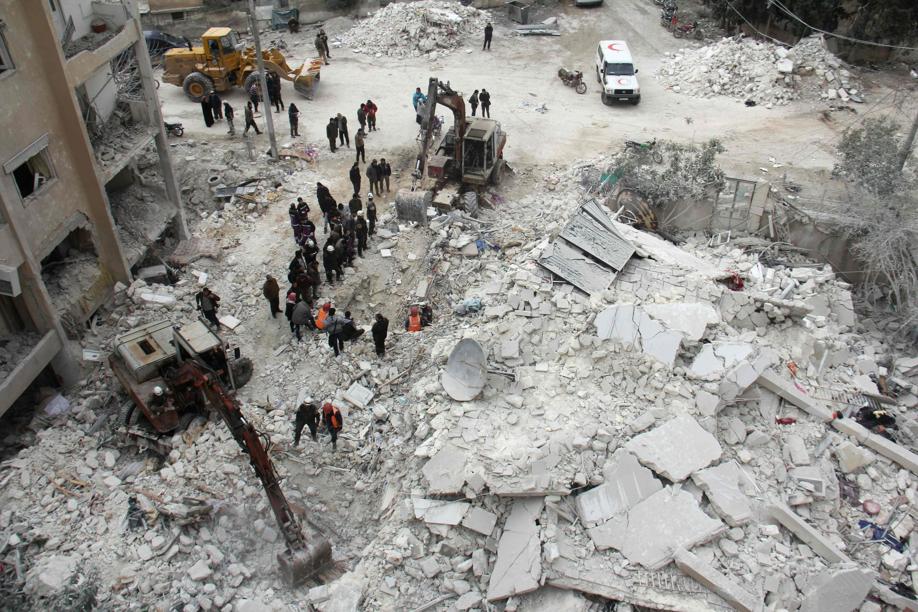
DAMASCUS — Suicide bombers hit the main judicial building and a restaurant in Damascus Wednesday, killing at least 30 people and spreading fear across Syria’s capital as the country’s civil war entered its seventh year with no end in sight.
The attacks bore the hallmarks of Syria’s Al Qaeda affiliate and reflect a renewed effort by the extremist group to use insurgent tactics against President Bashar Assad’s forces in a bid to recover lost momentum.
The first attacker, reportedly dressed in a military uniform, struck inside the Justice Palace, located near the famous and crowded Hamidiyeh market. The explosion left bodies lying amid pools of blood and shattered glass in the building’s main hall, where a picture of Assad hung on one of the walls.
The official news agency, SANA, said another suicide explosion about an hour later struck a restaurant in the Rabweh district of Damascus, an area known for its restaurants and cafes, leading to multiple casualties, mostly women and children. Syrian TV showed overturned plastic chairs and tables at the restaurant with bloodstains on the floor.
The Ikhbariyeh TV channel said the attacker was being chased by security agents when he ran into a restaurant and detonated his explosives vest there.
The bombings were the latest in a spate of deadly explosions and suicide attacks targeting government-controlled areas in Syria and its capital. There was no immediate claim of responsibility for either attack, but other, similar attacks in recent weeks were claimed by the Al Qaeda affiliate in Syria, which has come under pressure lately amid infighting with other insurgent factions in Syria and airstrikes by the US-led coalition.
The attacks came as Syrians mark the sixth anniversary of the country’s civil war, which has killed more than 400,000 people and displaced millions of others. The conflict began in March 2011 as a popular uprising against Assad’s rule but quickly descended into a full-blown civil war that has left large parts of the country in ruins. The chaos allowed Al Qaeda and later the Islamic State group to gain a foothold in the war-torn nation.
Geert Cappelaere, UNICEF regional director for the Middle East and North Africa, said Wednesday following a three-day trip to Syria that what he has seen is ‘‘unprecedented,’’ even in comparison to conflict zones like Yemen, Sudan, Sierra Leone, and Rwanda.
‘‘I have never seen a level of destruction so big as I have been seeing over the last few days,’’ he said.
Russia and Turkey, who back opposing sides of the conflict, have been working together to launch a political track focused initially on a cease-fire in Syria, and the UN’s Syria envoy held another round of peace talks in Geneva recently, but the talks have gone nowhere. Militant groups such as the Islamic State group and the Nusra Front, now known as the Levant Liberation Committee, are not part of those talks.
The recent attacks have struck at highly symbolic targets, and may mark the start of a new insurgency campaign by the Al Qaeda-linked militants to try and counter recent military advances by Assad’s forces, backed by Russia and Iran.
‘‘Deploying sleepers as suicide bombers deep behind enemy lines is [Al Qaeda’s] way of telling Syrians that it remains an invaluable component of the revolutionary struggle against the Assad regime and that the armed struggle is far from over, despite losses in Aleppo and elsewhere,’’ said Charles Lister, a senior fellow at the Washington-based Middle East Institute.
Wednesday’s bombings followed twin attacks on Saturday near holy shrines frequented by Shi’ites in Damascus that killed at least 40 people.
On Feb. 25, insurgents stormed into heavily guarded security offices in Syria’s central city of Homs, clashed with government troops, and then blew themselves up, killing a senior officer and at least 31 others in a major security breach. Both attacks were claimed by the Levant Liberation Committee.
There was no claim for Wednesday’s attack.



